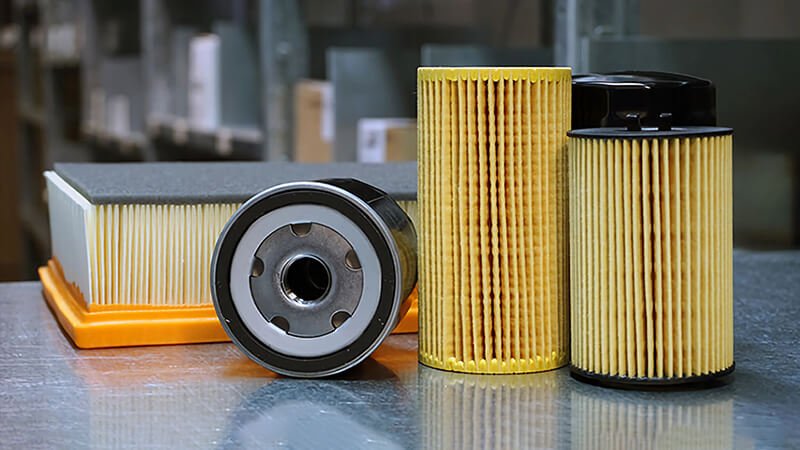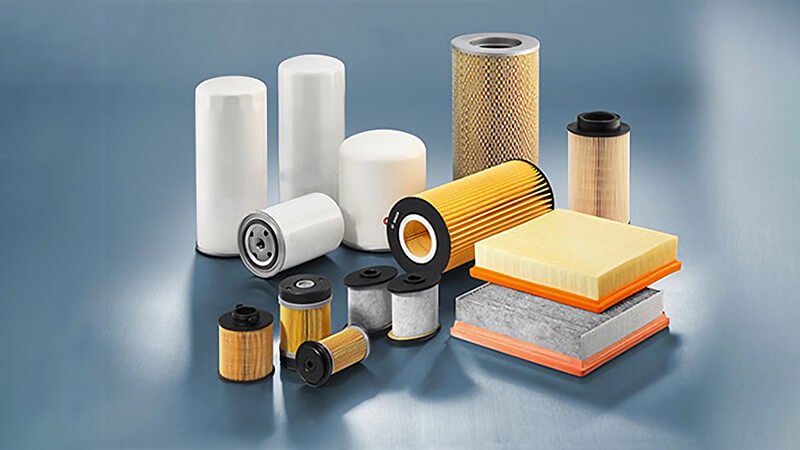Fuel filters are crucial in keeping diesel engines running smoothly. Yet, many people don't realize how important these filters are, especially when it comes to diesel engines. Without the right filter, your engine could suffer from poor performance or even damage.
Diesel engines rely on specialized fuel filters to keep out contaminants and ensure proper fuel flow. These filters help maintain engine efficiency and longevity. Understanding why diesel engines need specific fuel filters can prevent costly repairs and improve overall performance.
In this guide, we’ll explore the importance of fuel filters for diesel engines. From the differences between diesel and gas filters to why two filters are often used, you’ll gain a clear understanding of how they contribute to engine health.

Why do diesel engines need fuel filters?
Fuel filters are essential for diesel engines because they prevent dirt, rust, and other contaminants from reaching the engine. Diesel fuel often contains more impurities than gasoline, making high-quality filtration even more crucial.
Diesel fuel1 contains more particles, water, and sludge than gasoline. This can clog fuel injectors2, damage the engine, and reduce overall efficiency. Diesel fuel filters3 remove these contaminants, keeping your engine running smoothly and preventing costly repairs.
Diesel engines need fuel filters because diesel fuel itself is prone to contamination. Unlike gasoline, diesel fuel has a higher viscosity and can attract more water, debris, and dirt. These contaminants can clog the fuel injectors, causing uneven fuel distribution and poor combustion. This, in turn, reduces engine performance and efficiency.
Additionally, water in diesel fuel can lead to rusting and corrosion of the engine’s components. By using high-quality fuel filters, these contaminants are removed before they enter the engine, ensuring that only clean fuel is used for combustion. The primary function of diesel fuel filters is to protect the fuel system, prevent clogging, and maintain consistent fuel flow. This is essential for optimal engine performance and longevity.
Here’s a table outlining common contaminants found in diesel fuel and their potential impacts:
| Contaminant | Impact on Engine |
|---|---|
| Water | Corrosion, rusting |
| Dirt & Sand | Clogs injectors, reduces fuel flow |
| Bacteria & Fungi | Clogs filters, damages fuel system |
| Oxidation Products | Damages engine components |
With these contaminants in mind, it’s clear that diesel fuel filters are indispensable for maintaining engine health and preventing long-term damage.

Is there a difference between a gas fuel filter and a diesel fuel filter?
You might wonder if gas and diesel fuel filters4 are the same. While both serve the same basic function, they are designed differently to address the specific needs of their respective engines.
Gas and diesel filters differ in their design and filtration capacity. Diesel filters5 are built to handle larger amounts of debris and water, which are more common in diesel fuel6.
The main difference between gas and diesel fuel filters lies in the contaminants they are designed to handle. Diesel engines are generally exposed to more contaminants than gasoline engines. Diesel fuel often contains higher levels of particulate matter, water, and other impurities. For this reason, diesel fuel filters are typically larger, more robust, and have a greater capacity to trap debris and water.
Gasoline fuel filters, in contrast, focus on filtering out smaller particles and contaminants. Since gasoline is generally cleaner than diesel, there’s less need to deal with water or large debris. Gas filters also tend to have a finer mesh and are generally smaller in size compared to diesel filters.
Here’s a comparison table showing the differences:
| Feature | Diesel Fuel Filter | Gas Fuel Filter |
|---|---|---|
| Filtration Capacity | Higher (for larger particles, water, etc.) | Lower (for smaller debris) |
| Size | Larger and more robust | Smaller and finer mesh |
| Main Contaminants | Water, dirt, bacteria, rust | Small particles, dirt |
| Filtration Method | Multi-stage filtration | Single-stage filtration |
Diesel filters are equipped to handle more extreme conditions and contaminants, which is why they are more complex than their gasoline counterparts.

Why do diesel engines have two fuel filters?
It’s common to see diesel engines7 equipped with two fuel filters instead of one. You may wonder why this extra filter is necessary. Let’s break down why diesel engines often need more filtration.
Diesel engines use two fuel filters to provide extra protection. The first filter catches larger particles, while the second filter traps finer debris and water. This two-stage filtration ensures that only clean fuel reaches the engine, improving performance and longevity.
The reason diesel engines typically have two fuel filters is simple: added protection. The first filter, known as the primary filter, is designed to capture larger debris such as dirt, sand, and rust. It prevents these contaminants from entering the fuel system and potentially damaging the injectors and fuel lines.
The second filter, the secondary filter, is finer and designed to trap smaller particles and water. Water8 is a significant issue in diesel fuel, as it can cause rust and corrosion in the engine components. By using two filters, the system can effectively remove both large and small contaminants, ensuring that only clean fuel is delivered to the engine9.
Here’s a simple explanation of how the two filters work together:
| Filter Type | Function |
|---|---|
| Primary Filter | Removes large debris (dirt, rust, sand) |
| Secondary Filter | Filters out smaller particles and water |
This dual filtration system is a safeguard that ensures maximum protection for your diesel engine, extending its lifespan and preventing costly repairs.

Can you reuse a diesel fuel filter?
It’s tempting to consider reusing a diesel fuel filter10 to save costs. However, this is not recommended. Let’s dive into why reusing a fuel filter could lead to more harm than good.
Reusing a diesel fuel filter is not advisable. Over time, filters become clogged with contaminants and lose their ability to function properly. Using a used filter can cause poor fuel flow and engine damage, ultimately costing more in repairs.
Diesel fuel filters are designed to capture contaminants and prevent them from entering the engine. Over time, these filters become clogged with dirt, debris, and water. Once a filter has reached its capacity, it can no longer filter out harmful particles effectively. Reusing a clogged or old filter can lead to reduced fuel flow, engine misfires, or even complete engine failure.
A dirty filter restricts the fuel supply to the engine, which affects fuel combustion. This can lead to poor engine performance, higher fuel consumption, and increased wear and tear on engine components. Additionally, the contaminants that remain in the used filter could be reintroduced into the fuel system, causing even more damage.
Here’s a quick comparison of a used filter vs a new one:
| Filter Condition | Effect on Engine |
|---|---|
| Used/Clogged Filter | Poor fuel flow, engine damage |
| New Filter | Efficient fuel flow, clean fuel supply |
Replacing the fuel filter is a small investment compared to the potential cost of engine repairs. It ensures that the engine receives clean fuel and operates efficiently, so it’s always best to use a new filter when it’s time to change it.

Conclusion
In conclusion, diesel engines need special fuel filters to protect them from contaminants like dirt, water, and bacteria. With two-stage filtration systems, diesel engines ensure maximum engine protection and performance. While gas and diesel filters differ in design, they both serve the critical function of keeping the engine running smoothly. Regularly replacing diesel fuel filters and understanding their importance is essential for maintaining the health and longevity of your engine.
If you are looking for fuel filters for diesel enfines, do not hesitate to contact us11.
-
Helps understand the specific contaminants diesel fuel filters are designed to handle. ↩
-
Gives an overview of the contaminants typically found in diesel fuel that require filtration. ↩
-
Offers an explanation of the contaminants gasoline filters focus on. ↩
-
Explains the key differences between gas and diesel fuel filters and their respective roles. ↩
-
Helps understand the specific contaminants diesel fuel filters are designed to handle. ↩
-
Gives an overview of the contaminants typically found in diesel fuel that require filtration. ↩
-
Explains why two filters are essential for diesel engine protection and performance. ↩
-
Offers insights into the damaging effects of water contamination in diesel fuel. ↩
-
Describes the importance of the primary filter in removing larger contaminants. ↩
-
Explains why reusing diesel fuel filters is not a good idea and the risks involved. ↩
-
Click to know more information from Runex Auto. ↩













